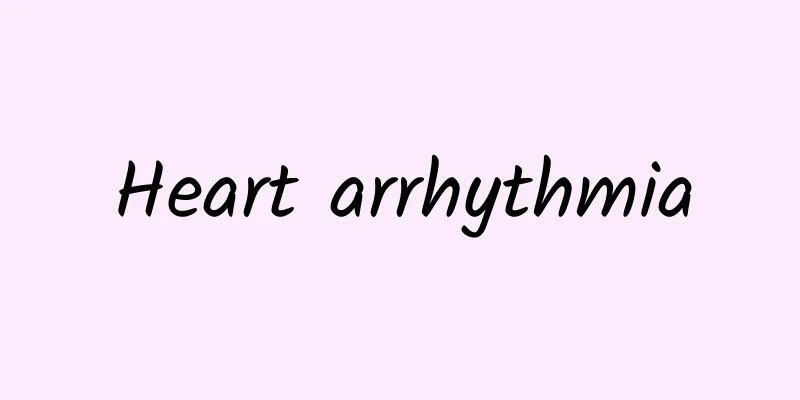Heart arrhythmia

|
Arrhythmia is a common and relatively complex cardiovascular disease. Since people know little about it, once an arrhythmia occurs, many people will have a strong sense of fear and be at a loss. In fact, there are many types of arrhythmias, and everyone may have arrhythmias in their lifetime. As people age, the chances of arrhythmias increase. However, not all arrhythmias will have serious adverse consequences, and not every arrhythmia requires treatment. 1. What is arrhythmia? Generally speaking, arrhythmia means tachycardia, bradycardia and irregular heartbeat. A normal heartbeat (ventricular beat) is 60-100 beats per minute, and the rhythm is generally regular. Tachycardia means the heartbeat is greater than 100 beats per minute, bradycardia means the heartbeat is less than 60 beats per minute, and irregular heartbeat means the rhythm is no longer regular. 2. “Everything happens for a reason” - What are the triggering factors of arrhythmia? (1) Physiological factors, such as emotional excitement, strenuous activities, anxiety, drinking strong tea, coffee, and alcohol, can cause rapid arrhythmia. (2) Organic heart disease, such as coronary heart disease, cardiomyopathy, myocarditis, valvular heart disease, etc. (3) Drug overdose or poisoning, such as digitalis, quinidine, etc., electrolyte imbalance, blood potassium disorder, blood calcium disorder, etc. (4) Other factors, such as hypoxia, ischemia, acidosis, anesthesia, etc., can also cause arrhythmia. 3. What discomfort does arrhythmia cause? (1) Rapid arrhythmia: manifested as palpitations, shortness of breath, and fatigue. If the patient has premature beats, he or she may feel a missed beat. If the patient has atrial fibrillation, he or she may feel a fast and chaotic heartbeat during an atrial fibrillation attack. (2) Bradycardia: The main manifestation is insufficient blood supply to the organs. In severe cases, it can cause syncope and insufficient blood supply to the brain, as well as symptoms such as dizziness, fatigue, drowsiness and forgetfulness. 4. What should you pay attention to during daily activities when experiencing arrhythmia? (1) Pay attention to the combination of work and rest: Live a regular life and choose appropriate physical exercises, such as walking, jogging, health exercises, Tai Chi, Qigong, etc. (2) Engage in appropriate work: Whether patients with arrhythmia can work depends on the severity of the arrhythmia. Patients with good heart function can participate in work within their ability. (3) Patients with a history of syncope should avoid engaging in dangerous work such as driving and working at heights. 5. Atrial fibrillation causes the heart to beat irregularly and the pulse and heart rate are completely messed up. Let’s take a look at the specific symptoms. (1) Main symptoms of the disease: Patients often feel palpitations and chest tightness. (2) Symptoms of underlying diseases: Symptoms of atrial fibrillation are related to the patient's underlying condition. Past concurrent heart diseases, such as hypertension, coronary heart disease, myocardial infarction, or heart failure, will aggravate the original symptoms after atrial fibrillation occurs due to the faster ventricular rate, causing chest tightness and chest pain, inducing or aggravating heart failure, and causing syncope, which is a relatively serious condition. (3) No symptoms: Most patients with atrial fibrillation have no symptoms. Patients may only be diagnosed with atrial fibrillation after they have suffered a stroke and go to the hospital for treatment. 6. How do patients with atrial fibrillation check their own pulse? The pulse rate is usually measured by touching the radial artery, femoral artery or carotid artery to count the pulse rate for one minute. Because the pulse rate of patients with atrial fibrillation is lower than the heart rate, the heart rate cannot be used to replace the pulse rate. When measuring the blood pressure of patients with atrial fibrillation, the sphygmomanometer will display the number of pulse beats, but this number is basically the calculated average value and is not completely accurate, so the most accurate method is to measure manually and count the pulse beats per minute. 7. How to manage the diet of patients with arrhythmia? Pay attention to regular diet, avoid overeating, and avoid eating spicy and irritating foods. If the arrhythmia patient has hypertension, a low-salt diet should be adopted, and the daily salt intake should not exceed 6g. If there is coronary heart disease, a low-fat diet is required, and the daily edible oil intake should not exceed 20g. If there is diabetes, the diabetic diet should be strictly followed. Pay attention to rest, avoid staying up late, reduce work pressure, develop good living habits, quit smoking and limit alcohol, and maintain a good attitude. |
<<: Breast self-examination, say goodbye to cancer
>>: Myocardial infarction - May you know it, respect it, and stay away from it
Recommend
Postpartum bleeding in stool anal pain
Bleeding in the stool and anal pain after giving ...
Abnormal vaginal discharge after menopause
When women reach their 40s or 50s, most of them s...
Is congenital uterine malformation harmful?
Uterine malformation is now a common gynecologica...
Smell is the first sign of a serious illness! 7 odor signals of illness that can be detected
A comatose male patient in his 30s was sent to th...
How long after getting your ears pierced can you touch water?
Nowadays, many girls choose to pierce their ears ...
What should women do if they urinate frequently after drinking water?
Generally speaking, the amount of urine will incr...
How to remove eyeliner? These things to keep in mind
Women who love beauty often draw eyeliner. They w...
What is the method of breast enhancement through the bladder meridian?
Women all want to have firm breasts. Those with f...
How long does it take for the follicle to mature before it is released?
During the ovulation period, the female body is r...
Is it okay to eat sweets while pregnant?
During pregnancy, women will have a special prefe...
It’s the right time to protect your health in early spring when the weather is still cold
In early spring, the ground warms up and the gras...
Can a child still grow taller after menstruation?
In daily life, we often hear some female friends ...
Do I need to fast for the 42-day postpartum checkup?
42 days after giving birth, the pregnant woman ne...
Is it normal to have bleeding during sex a few days before your period?
Menstruation is a physiological cyclical period t...
Does spontaneous abortion require uterine curettage?
The so-called uterine curettage in medicine refer...









